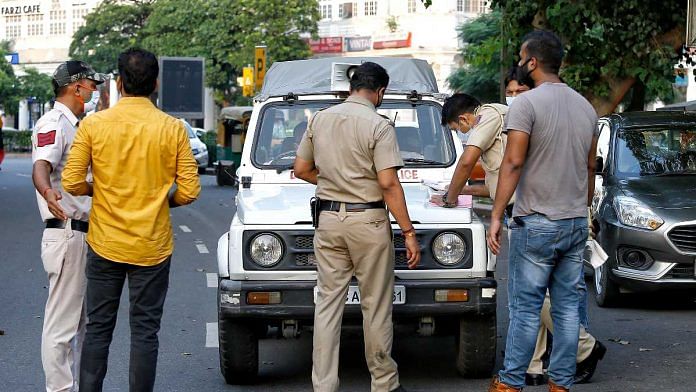New Delhi: To ensure stricter implementation of road safety rules and to check “malpractices” by enforcement personnel, the Narendra Modi government is considering equipping police personnel with body wearable cameras and dashboard cameras, according to a new draft notification.
These cameras will be on police personnel to check violators when they are being challaned.
These will ensure further proof of a violation of road safety measures, and also that there are “no malpractices by police personnel”, said a senior official in the Ministry of Road Transport and Highways, who didn’t wish to be named.
On Thursday, the ministry issued the draft notification titled, Electronic Monitoring and Enforcement of Road Safety, as an amendment to the current Central Motor Vehicle Rules, 1989.
The notification says, “Both the video and audio functions of the body camera shall be activated only when the law enforcement official is on duty and the official must notify the subjects that they are being recorded by the body camera.”
According to the draft, these body wearable cameras can be used to record proceedings of an event, and as evidence in court against a person violating traffic safety norms. They can “also ensure that the law enforcement official has acted as per the provisions of law while penalising the offending driver or person”.
The ministry has been put the draft notification in the public domain to invite comments and suggestions. The final notification will be issued a month later, after incorporating any relevant comments.
Also read: 15 yrs in the making, Rs 9,000-cr Delhi-Gurugram expressway now looks at Sept 2022 completion
What are body wearable cameras?
Body wearable cameras are used by police officers in the US as well as the UK. The practice began in the US as early as 2013, according to the Bureau of Justice Statistics.
A study on a police department in California found that after the body camera rule was initiated, there was a 59 per cent reduction in police-reported use of force incidents among officers.
Among the many demands for body cameras for law enforcement are holding police personnel accountable, ensuring transparency to build trust among citizens and better collection of evidence for investigation.
Body cameras were also advocated in the US to help document excessive use of force on communities of colour.
While there has been a mixed response on the effectiveness of body cameras, the US Justice Department’s body camera programme found that 11 out of 19 studies showed there was a reduction in the use of force among officers wearing cameras.
What India’s draft notification says
The draft refers to various “electronic enforcement devices” to penalise overspeeding, not wearing helmets, jumping a red light, using phones while driving, driving without a seat belt, among other violations.
These devices also include dashboard cameras, speed guns, closed-circuit television cameras and Weigh-in-Motion technology.
Similar to a body camera, a dashboard camera can be placed in the front of a police vehicle to monitor any violation of traffic safety norms.
The draft notification stipulates that even while recording using a dashboard camera the police personnel must inform the “offender” that they are being recorded.
It also states that the electronic records through electronic monitoring should be stored for a minimum period of 30 days, and “in the case where the electronic record relates to an offence, should be stored till the conclusion of proceedings initiated, including appeals”.
It further provides in the event of the vehicle not being driven by the owner at the time of offence, they can claim innocence by providing proof.
Also read: Sports stadiums could soon be leased out to private sector as govt plans asset monetisation




First ban truck in right lane. Will save 80% highwy death